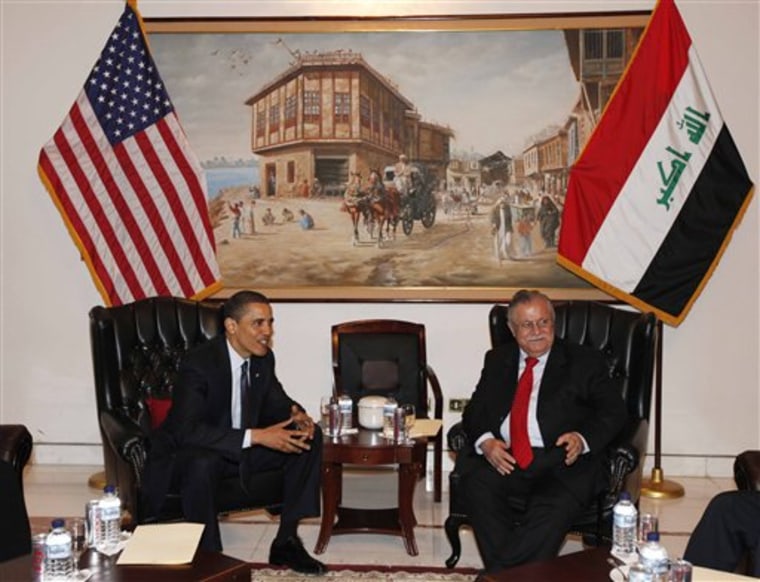The last time an American president showed up in Iraq he was greeted with boos and shoes.
That, as they say, was then.
On Tuesday, Iraqis expressed warmth for a visiting Barack Obama. And in another sign the country is eager to cast aside the legacy of the former administration, a court reduced the jail term for the journalist who hurled his shoes at George W. Bush.
Never mind that President Obama spent just five hours on the ground and did not venture outside the sprawling U.S. military complex around Baghdad International Airport. Sandstorms made traveling into the capital difficult after he made a stopover on the way to Washington from his tour of Europe and Turkey.
Never mind that the new president's timetable for withdrawing U.S. troops is basically the same one accepted by the Bush administration during its final months in office.
Obama isn't Bush, and for many Iraqis that's good enough for now.
"The Iraqi people welcome the new American president in good faith, not like the former President Bush, who is rejected by all Iraqi people from the north to the south," Baghdad resident Rasheed al-Jumaili said.
Few Iraqis caught a glimpse of the president, and government television aired his appearance with Iraq's prime minister only after Air Force One took off for Washington.
A refreshing change
Still, many Iraqis find Obama's style, including his openness to the Muslim world, a refreshing change from the previous administration, even though the wars in Iraq and Afghanistan continue.
"We expect positive relations with the Americans," said Alia Kamil, a senior at the University of Baghdad. "We will see positive developments in Iraqi-American relations because it sounds like Obama's ideas for Iraq will be good."
Privately, a number of Iraqi leaders feel gratitude toward Bush for ousting Saddam Hussein, even if they don't express those feelings in public because of widespread outrage over the turmoil and bloodshed that followed the March 2003 invasion.
Public anger toward Bush boiled over last December when Iraqi TV journalist Muntadhar al-Zeidi hurled his shoes at the American president during a Baghdad news conference with Iraq's prime minister.
His action violated nearly every principle of Arab hospitality. But it turned al-Zeidi into a folk hero in Iraq and throughout the Arab world for standing up to a leader many Iraqis blame for destroying the country. Thousands marched to demand his release.
Nevertheless, the 30-year-old journalist was convicted last month of assaulting a foreign leader and sentenced to three years in prison. On Tuesday, the appeals court reduced the sentence to one year.
With credit for time served and good behavior he could be out in five months.
"We think al-Zeidi does not deserve to be imprisoned even for one day," chief defense attorney, Diaa al-Saadi, said. "What he has done falls in the category of freedom of expression, and he was trying to express his anti-occupation feelings."
Putting bitterness behind them
Despite al-Saadi's opinion, the appeals court offers a way for Iraqis to help put the bitterness of the Bush years behind them.
That's something that even some enemies of the U.S.-backed government seem eager for.
Saddam's former deputy, who is now reportedly a major financier of Sunni insurgents in Iraq, said in an audiotape broadcast Tuesday on Al-Jazeera television that he wants good relations with the Obama administration — if U.S. troops leave the country and the current government is toppled.
If that happens, a new Iraqi government would be ready to "build the best of relations with the American people and the new administration," Izzat Ibrahim al-Douri said.
In the Shiite holy city of Najaf, 100 miles south of Baghdad, construction worker Mohammed Muhsin puffed on a waterpipe at the Dumyat cafe as he watched television footage of Obama speaking earlier in the day before Muslim students in Istanbul, Turkey.
"The visit of President Obama makes me feel optimistic," Muhsin said. "I do believe that he is much better than his predecessor Bush. We feel happiness that President Obama is preparing for the withdrawal of occupation forces from Iraq."
Obama has pledged to withdraw all U.S. combat troops by September 2010 and remove all U.S. forces by the end of 2011 — a final departure date that Bush agreed to last year.
Some Iraqis withheld judgment on Obama, waiting to see what the new president will do in Iraq.
"If Obama seeks good things for Iraq, we will embrace him," said Baghdad resident Aqeel Mohammed. "But if he treats us like President Bush did, then we will not."
Abdul-Jabbar Mohammed, a professor of political science at the University of Baghdad, said Obama — like Bush — will ultimately be judged on whether the U.S. can bring security to Iraq.
"He must see how he can establish stability in Iraq," Mohammed said. "So far, I don't know whether President Obama can provide real security to the Iraqi people."
